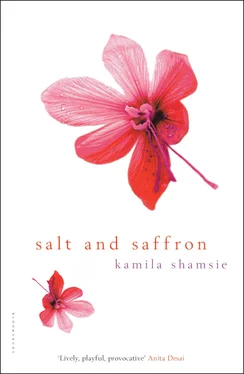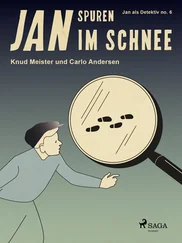‘Uff! The stereotypes …’
‘What’s stereotyped about thinking people want to get their children to safety? You know what most of Karachi calls our part of town? Disneyland.’
‘Your point?’
‘The poor live in Liaquatabad. The poor, the lower classes, the not-us. How else do you want me to put this? There’s no one we know who would have exchanged Karachi phone numbers with him, Aloo. No one. And, do I have to say this, you especially …’ She turned away in irritation, or perhaps it was frustration.
‘Finish that sentence.’
‘Try this sentence instead: after everything that happened four years ago no one, not even you, will ever trust any feelings you have for him. You can hit me, Thaassh! Dhuzh! Dharam! if it’ll make you feel better.’
I might well have taken her up on that, had a man, stooped and rheumy-eyed, not twitched my sleeve and said, ‘If I had amnesia and I saw you I’d pray you played a part in my life.’
‘Perhaps you do,’ I said. ‘Perhaps I do.’
Tears came to his eyes. ‘Our lives await memories. That’s all.’ He kissed my hand and walked away.
Samia knew well enough not to say anything. She started walking down the street, a few paces ahead of me, but aware enough of my footfall to look back when I stopped to scrape a bit of banana off the sole of my shoe. I refused to catch her eye. How could she just pull me off the train like that? How could she? Could she? Could she do such a thing if I were not willing? Could she have done it if in that split second between Khaleel saying ‘Liaquatabad’ and Samia’s hand reaching out to grab mine I hadn’t already thought of escaping? If I had amnesia, would I have stayed on that train? Imagine that. To be freed of remembered biases. To have nothing to consider but the moment itself; nothing but the moment and the touch of his fingers.
Our lives don’t await memories, I decided; they are crippled by memories. Oh, I knew exactly which memories crippled me, crippled me into running away from him. (Mixing metaphors was the least of my problems.) But I’ve accepted what happened four years ago! I wanted to shout out. I’ve deconstructed it, analysed it, and I have refused to take on the attitude of my relatives with their centuries of inbred snobbery. Why can’t my heart be as evolved as my mind? Why did ‘Liaquatabad’ hit me so bruisingly in the solar plexus?
Perhaps there’s no escape from wounding memories. Time was, I thought time was all it took to move on. But how could I be a part of my family and believe that? We are all the walking wounded. Take this relative we were about to meet: Baji. Fifty years on from Partition, and according to Samia she still couldn’t talk about those who left for Pakistan without rancour. That whole generation of my relatives mystified me. How had they sustained, for so long, the bitterness brought on by the events of 1947? I could believe it of one person, or two, but good God! our family was huge and yet there was never any word of reconciliation across the borders of India and Pakistan. They grew up together: Dadi and Baji and the triplets and scores of other cousins. They were to each other what Samia and Sameer were to me, and I to them. They were to each other what Mariam Apa … Oh, Lord. How do you stop missing the people you loved before you could say ‘love’? If I had the option of inheriting that ability, would I take it?
Change the subject, I told myself. Think of reasons to stop being angry at Samia.
‘So, listen,’ Samia said when I caught up with her minutes later, having finally convinced myself that exiting the Tube when we did was regrettable in the abstract but, practically speaking, had forestalled later embarrassment. ‘Just don’t say anything that could start a conversation about Partition. And do not even begin to start to think about somehow indirectly referring to your grandparents. She blames them more than anyone else for the split in the family. Your Dadi, especially; she’s liable to start ranting at the mention of her name. I haven’t dared to ask why.’
‘You might want to tell me how exactly we’re related to this Baji person.’
‘Our grandmothers are her second cousins.’
‘Well, bless my beehives. That’s the least complicated explanation I’ve ever heard.’
‘I haven’t finished, of course. Your grandfather — Akbar—’
‘I know who my grandfather was, thank you.’
‘Shut up. And this isn’t America, you need to look right, not left, to check for oncoming traffic. Akbar and Baji — her name is Farahnaz but everyone calls her Baji — were first cousins. Akbar’s father—’
‘The yak man.’
‘Yes, the yak man had a half-brother named Abdul, and this is Abdul’s daughter.’
‘Anything else?’
‘Her mother had tantalizing elbows.’
‘Oh.’
The presence of ‘people without family’ on my family tree was always explained away in the following manner: she was walking this way, he was walking that way, she had tantalizing elbows, nine months later this one was born. I had heard a great deal about those women who had elbowed their way, so to speak, on to the family tree, but this would be my first time meeting the progeny of such a woman.
(By the way, Taj’s mother did not have tantalizing elbows — perhaps that’s why, unlike all those other women of low birth, she did not marry the father of her child and take her place in the zenana where the women schemed, plotted, forged alliances, jostled for favour, laughed, befriended each other, complained about men, teased the eunuchs, and conducted grand affairs with each other. This last detail was not part of the oral history of our family but Samia had once declared that it was absurd to assume otherwise and Dadi’s response — disapproval but not denial — convinced Sameer and me that Samia must be on to something.)
Samia stopped outside a block of flats and pressed the buzzer to Flat 8. Before there was any response from the occupants of the flat, the doorman let us in and waved us towards the lift.
‘This thing is as big as my dorm room,’ I said, and stepped into the lift. It was only when I heard my own voice that I realized I was nervous. I lay down on the plush carpet and closed my eyes as the lift hummed its ascent.
‘Up.’
The lift door opened and I took Samia’s hand and levered myself off the ground. She brushed a few strands of dog hair off my shirt, straightened my collar, pinched colour into my cheeks and pushed my hair off my face. ‘She should approve,’ my cousin said and pushed open the unlocked door to Flat 8.
She didn’t.
‘You!’
It wasn’t a pronoun, it was an accusation. I blinked in the darkness of the hallway which opened out into a drawing room cluttered with furniture, pictures, books and no human being that I could see. ‘You!’ the voice said again, and now I saw the tiny woman on the sofa, surrounded by piles of fabric. Was it fabric or more tiny people? Samia manoeuvred her way gracefully through a maze of tables to bow down in an aadab before the woman and kiss her wrinkled cheek.
‘Baji, don’t do the imperious bit. You’ll frighten her. Stinky! Smelly!’
A door opened and two children ran in, whisked away the piles of fabric, turned on the lights and disappeared back into the room from which they came. Even with the lights on I knocked my legs against two table corners before reaching a suitable aadaab position. Baji didn’t respond to my aadaab with the traditional ‘jeeti raho’ so I didn’t kiss her. Whatever her feelings towards my grandparents there was no need for her to forego wishing me continued life. Manners above all. Qaida. Saleeqa. Hadn’t anyone ever taught her that? It’s those tantalizing elbow genes, I caught myself thinking, and refused to follow Samia’s lead and sit down until I was expressly invited to do so.
Читать дальше












